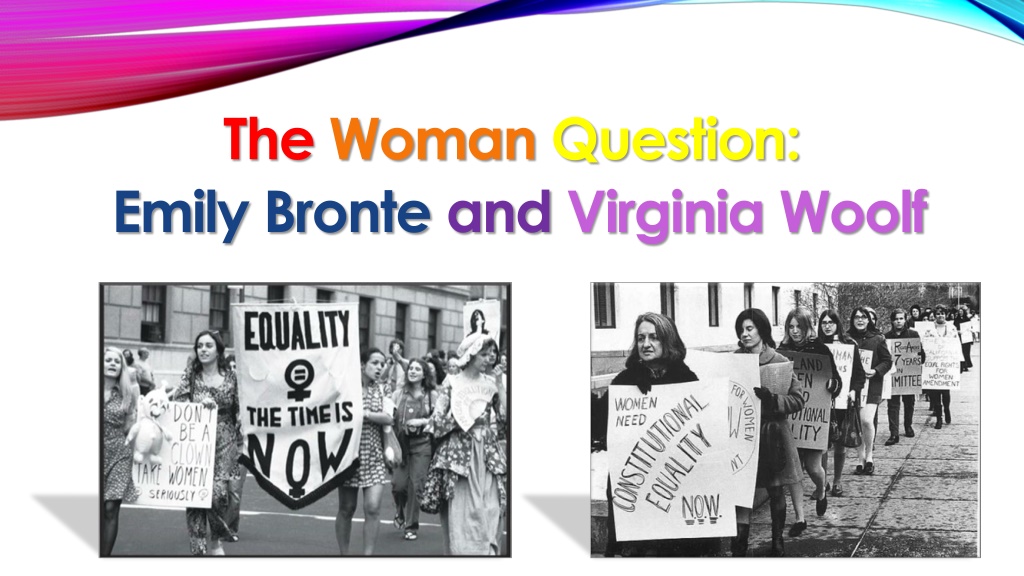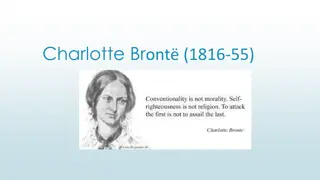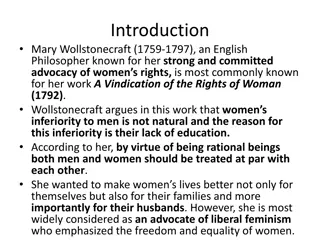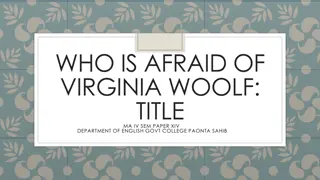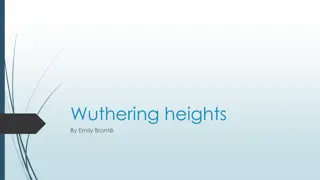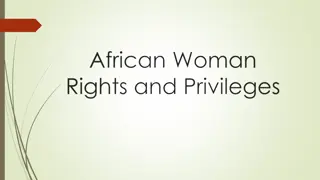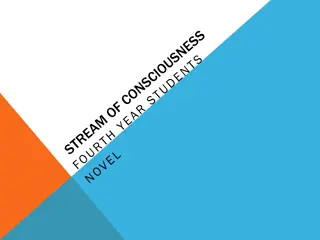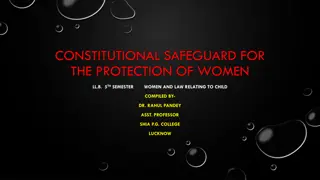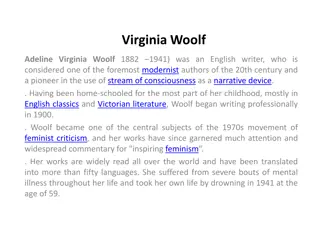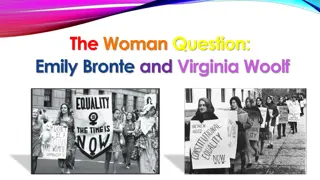Evolution of Women's Rights in Literature: From Bronte to Woolf
The evolution of women's rights in literature spans from the works of Emily Bronte, with her passionate defiance of societal norms in "Wuthering Heights," to Virginia Woolf's call for economic and intellectual freedom in the feminist classic "A Room of One's Own." This journey reflects the struggles and advancements in women's roles and equality from the 17th to the 20th century, encapsulating the power of imagination, love, and the fight for liberation.
Download Presentation

Please find below an Image/Link to download the presentation.
The content on the website is provided AS IS for your information and personal use only. It may not be sold, licensed, or shared on other websites without obtaining consent from the author. Download presentation by click this link. If you encounter any issues during the download, it is possible that the publisher has removed the file from their server.
E N D
Presentation Transcript
The Woman Question: Emily Bronte and Virginia Woolf
XVII-XIX century Woman question MARY WOLLESTONCRAFT her A vendication of the rights of woman (1798) was considered the first feminist pamphlet. XVII-XVIII EARLY XIX CENTURY advance of middle class Major change in the direction of European society. IDE SOCIAL Industrial revolution: Women were equal to men in money- earning power. IDEOLOGICAL Enlightenment: all human beings had the same rights. Worst conditions for women: Rigid sexual and social behaviour of Victorian standards OLOGI Family came to be challenged by degree Husband considered as a tyrant (J. S. Mill, The subjetcion of women , 1869) END OF XIX CENTURY Women could study and take a degree at twelve university colleges First petitions asking for women s suffrage since 1840 MID XIX CENTURY Things began to change Second step: Married Women s property act (1882) First step: Foundation of colleges for women Women allowed by law to own property after marriage Woman didn t get the right to vote until 1918
Emily Bronte Emily Bronte 1818 1818--1849 1849 Both of her parents had Celtic origins: this meant for her a background of fantastic story-telling. She lived in the desolate Yorkshire moors: In this enviroment her imagination was constantly stimulated by nature. Emily s novel and poems: Passion and feelings; Violent impulse to break through life s conventions; Desperate need for a freer world of the spirit; Power of imagination
WUTHERING HEIGHTS (1847) a modern love story Wild spirit; It describes the life-long passion between Heathcliff, a dark romantic hero, and Catherine Linton, a passionate young woman oppresed and divided by social conventions. For the first time in Victorian literature there is a passionate love; Exaltation of feelings over reason and of a mystical union with nature. Two narrators: complex shifting of the point of view. So he shall never know how I love him: and that, not because he's handsome, Nelly, but becouse he's more myself than I am. Whatever our souls are made of, his and mine are the same; and Linton's is as different as a moonbeam from lightning, or frost from fire Setting: Trushcross Grange (in the valley) Wuthering Heights (up on the moor) Home of social convention Home of unrestrained passion and istinct.
XX century Womens road to equality First step: The role of women, their psychological and intellectual characteristics and their relationship were amply debated. Work which marks the beginning of woman consciousness: A room of One s Own (1929) by Virginia Woolf stresses the necessity for women to gain economic and intellectual freedom. Lock up your libraries if you like; but there is no gate, no lock, no bolt that you can set upon the freedom of my mind. Rise of the women s movement: Since 1945 a new feminism began to form and express itself, especially in the USA. Founding of NOW National organization for women
Original womens voices: Sylvia Plath The American poet became a charismatic figure for the feminists of the 60s and 70s for her tragic death (suicide) that made her a symbol of the tensions and the sufferings to which many women are subjected in society. Toni Morrison The first black woman to be awarded the Noble Prize for literature. Sylvia Plath Her novel Beloved combines the issues of race and gender in American society
Realized by: Bruno Agnese Lucia Magistro Damiana Sciacca Maria Scuderi Manuela Anno Scolastico 2016/2017 Classe V sez B scientifico Sources: Cattaneo-De Flaviis,Millennium, Signorelli; Google images.
